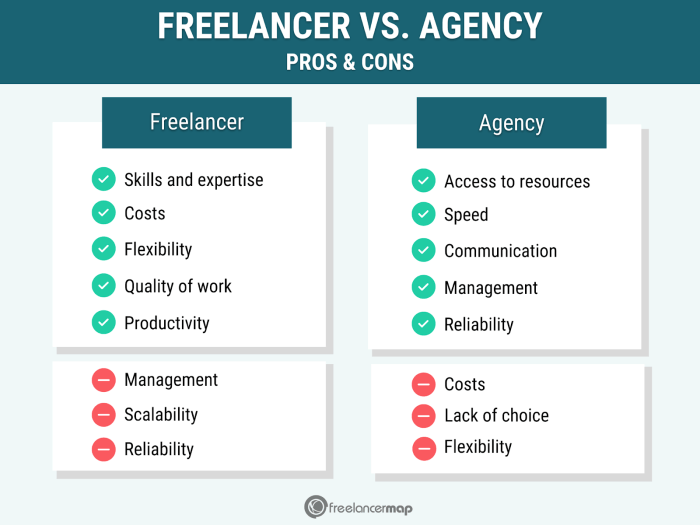Pros and Cons of Hiring Freelance vs Company-Based Contractors: A Comprehensive Comparison
Delving into the realm of hiring freelance contractors versus company-based contractors, this article uncovers the intricacies of each option, shedding light on the advantages and disadvantages that come with either choice. Brace yourself for a journey through the world of contracting, where flexibility meets stability, cost-effectiveness battles with quality, and communication intertwines with collaboration.
Pros and Cons of Hiring Freelance vs Company-Based Contractors
When deciding between hiring freelance contractors or company-based contractors, there are several factors to consider. Let's explore the advantages and disadvantages of each option.
Flexibility vs Stability
One of the key differences between hiring freelance contractors and company-based contractors is the level of flexibility and stability they offer. Freelancers are often more flexible in terms of working hours and project timelines. They can adapt quickly to changes and work on multiple projects simultaneously.
On the other hand, company-based contractors provide a sense of stability as they are part of a larger organization. This can be reassuring for long-term projects and ensures continuity even if individual team members change.
Cost-Effectiveness
When it comes to cost-effectiveness, hiring freelance contractors can be more budget-friendly in certain situations. Freelancers typically have lower overhead costs compared to company-based contractors, which can translate to savings for the client. However, company-based contractors may offer bundled services or discounts for long-term contracts, making them a cost-effective option in the long run.
Quality of Work
The quality of work produced by freelance contractors versus company-based contractors can vary based on individual skills and experience. Freelancers are often specialists in their field and can provide a high level of expertise in specific areas. On the other hand, company-based contractors may have access to a wider range of resources and collective expertise within the organization, leading to consistent quality across projects.
Experience and Expertise
When it comes to hiring contractors, one of the key considerations is the experience and expertise they bring to the table. Both freelance and company-based contractors offer unique advantages in this regard.Freelance Contractors:
Diversity of Skills
- Freelancers often have a diverse range of skills, as they work with multiple clients across different industries.
- This diversity allows freelancers to bring a fresh perspective and innovative ideas to the table.
- Freelancers can adapt quickly to new projects and provide specialized skills that may not be available in-house.
Company-Based Contractors:
Specialized Expertise
- Company-based contractors may offer specialized expertise in a particular area or industry, honed through years of experience.
- These contractors often work as part of a team, allowing for collaboration and knowledge sharing that can benefit the project.
- Working with company-based contractors can provide a sense of stability and reliability, especially for long-term projects.
Communication and Collaboration
Effective communication and collaboration are essential for successful project outcomes when working with contractors. This section will delve into the differences between freelance and company-based contractors in terms of communication and collaboration.
Ease of Communication
When it comes to freelance contractors, communication can sometimes be a bit more challenging compared to company-based contractors. Freelancers often work remotely and may have varying schedules, making it crucial to establish clear communication channels and expectations from the start.
- Freelancers may prefer email or messaging platforms for communication, which can sometimes lead to delays in responses.
- On the other hand, company-based contractors usually have set working hours and dedicated communication channels, making it easier to reach them when needed.
Responsiveness and Availability
The level of responsiveness and availability can vary between freelance and company-based contractors, impacting project timelines and deliverables.
- Freelancers may not always be available during regular working hours, leading to potential delays in communication and project progress.
- Company-based contractors are typically more responsive and readily available during working hours, ensuring quicker turnaround times for queries and feedback.
Impact of Communication Channels
The choice of communication channels can significantly influence project outcomes when collaborating with contractors.
- Effective communication channels that are easily accessible and conducive to collaboration can enhance the overall workflow and productivity of the project.
- Clear communication ensures that project requirements are understood correctly, reducing the likelihood of misunderstandings or errors during the execution phase.
Project Management and Accountability

When it comes to managing projects and ensuring accountability, the choice between hiring freelance contractors or company-based contractors can have a significant impact on the outcome. Let's delve into the differences in project management and accountability between these two types of contractors.
Role of Project Management with Freelance Contractors
- Freelance contractors often work independently and may require less hands-on project management compared to company-based contractors.
- Project managers need to clearly define project requirements, timelines, and deliverables upfront to ensure smooth collaboration with freelancers.
- Regular check-ins and updates are essential to track progress and address any issues that may arise during the project.
Accountability Differences
- Freelancers are typically responsible for their own work and deliverables, which can lead to a higher level of accountability compared to company-based contractors.
- However, freelancers may have other projects or commitments that could potentially impact their availability and ability to meet project deadlines.
- Company-based contractors, on the other hand, may have a team to rely on for support, but individual accountability may be diluted within the organizational structure.
Impact on Project Timelines and Deadlines
- Freelancers may offer more flexibility in terms of project timelines, as they can often work outside regular business hours to meet deadlines.
- However, the risk of delays may be higher with freelancers due to unforeseen circumstances or competing priorities.
- Company-based contractors may have a more structured approach to project management, with defined processes and resources in place to ensure timely delivery.
- Strict project timelines and deadlines are crucial when choosing between freelancers and company-based contractors to ensure project success and client satisfaction.
Closing Notes
As we wrap up our exploration of the Pros and Cons of Hiring Freelance vs Company-Based Contractors, it becomes evident that each path holds its unique set of benefits and drawbacks. Whether you opt for the freedom of freelancers or the reliability of company-based contractors, the key lies in understanding your specific needs and priorities for successful project outcomes.
Answers to Common Questions
What is the key difference between hiring freelance and company-based contractors?
Freelancers offer flexibility while company-based contractors provide stability in terms of employment.
Are freelancers more cost-effective compared to company-based contractors?
Freelancers generally come with lower overhead costs, making them a more budget-friendly option in many cases.
How does communication differ when working with freelance contractors versus company-based contractors?
Freelancers tend to offer more direct and flexible communication channels, while company-based contractors may have stricter protocols in place.
Do freelancers or company-based contractors typically offer a wider range of skills?
Freelancers often bring a diverse set of skills to the table, while company-based contractors may offer more specialized expertise in certain areas.
Which type of contractor is more likely to bring fresh perspectives and innovative ideas to a project?
Working with freelancers often opens up opportunities for fresh perspectives and innovative approaches due to their varied experiences.




